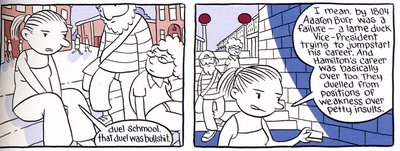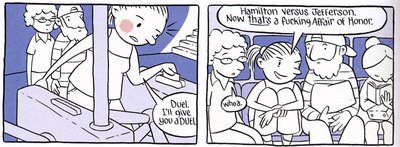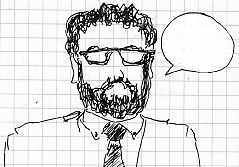Monday, August 28, 2006
Megan Kelso's Early American Thing
The Squirrel Mother (Fantagraphics Books, 2006) is an assured collection of thoughtful short pieces, some of which I continued to think about long after I finished Kelso's book for the first time. Her youngsters come across as complicated human beings, and she has a nice knack for conveying the subtle undercurrrents of thought, emotion, and motivation which make human relationships and interactions unpredictable.
The book contains three charming "historical" stories that particularly appealed to me. In "Publius," the schoolgirl heroine identifies so deeply with the passionate young Hamilton that, after nodding off at her typewriter, she vividly conjures up the charged energy between Madison and Hamilton, fine young things that they once were. (The paper she finishes when she awakens is titled "I [heart] Alexander Hamilton.")
Kelso uses the framing device of an older woman's speech before the Daughters of the Federalists in "Aide de Camp." The talk is delivered on August 9, 1974, the day on which Richard M. Nixon resigned the presidency. The story deftly explores Hamilton's relationship with George Washington, with the first part nimbly describing the labors he expended on editing and perfecting the first president's farewell address.
"The Duel" is my favorite of the three. While it explores Hamilton's death, it also covers his contest of ideas (and will) with Thomas Jefferson when they both served in Washington's cabinet.
Although the story contains several panels that made me smile and chuckle, these four made me surrender and laugh out loud:

 In addition to having the character deliver a killer line in that last panel, Kelso captures the look of intensely committed enthusiasm that every teacher hopes to see in her student's eyes.
In addition to having the character deliver a killer line in that last panel, Kelso captures the look of intensely committed enthusiasm that every teacher hopes to see in her student's eyes.
Kelso's rewarding collection is filled with deceptively simple gems such as these.
The book contains three charming "historical" stories that particularly appealed to me. In "Publius," the schoolgirl heroine identifies so deeply with the passionate young Hamilton that, after nodding off at her typewriter, she vividly conjures up the charged energy between Madison and Hamilton, fine young things that they once were. (The paper she finishes when she awakens is titled "I [heart] Alexander Hamilton.")
Kelso uses the framing device of an older woman's speech before the Daughters of the Federalists in "Aide de Camp." The talk is delivered on August 9, 1974, the day on which Richard M. Nixon resigned the presidency. The story deftly explores Hamilton's relationship with George Washington, with the first part nimbly describing the labors he expended on editing and perfecting the first president's farewell address.
"The Duel" is my favorite of the three. While it explores Hamilton's death, it also covers his contest of ideas (and will) with Thomas Jefferson when they both served in Washington's cabinet.
Although the story contains several panels that made me smile and chuckle, these four made me surrender and laugh out loud:

 In addition to having the character deliver a killer line in that last panel, Kelso captures the look of intensely committed enthusiasm that every teacher hopes to see in her student's eyes.
In addition to having the character deliver a killer line in that last panel, Kelso captures the look of intensely committed enthusiasm that every teacher hopes to see in her student's eyes.Kelso's rewarding collection is filled with deceptively simple gems such as these.
